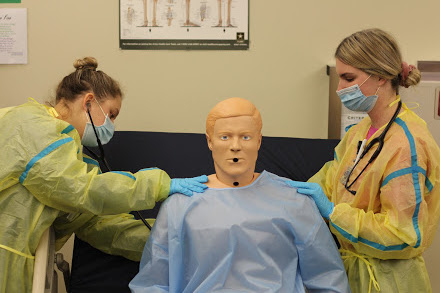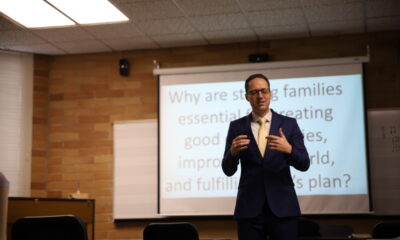Features
Students today, nurses tomorrow; students share their difficulties entering and graduating from NIC’s nursing program
North Idaho College’s nursing program is one of the college’s most popular programs. However, its popularity makes it difficult to enter, with about 160 applicants each year and only the top 40 accepted into the program.
“There can be high emotion in the process of becoming a nurse,” said Jeff Davis, a nursing adviser at NIC. “Just getting into the program is very competitive, and the prerequisite coursework is some of the most challenging in all our programs. It can be devastating for those who don’t get in.”
There are 27 required classes in the nursing program, with a total of 68-70 credits. Nursing classes include general microbiology, medical-surgical nursing and transition to nursing practice, along with several others. The program also requires a GPA of 2.0 or higher.
Morgan Cloke, a second-year student at NIC, is currently working on her prerequisites for the program by taking statistics, English, biology, physiology, microbiology and more.
“I always wanted to help people,” Cloke said. “I have several nurses in my family, so it seemed like a very natural route for me. I’ve always wanted to become a midwife.”
Melissa Mitzel, a student entering the nursing program, had a challenging time with the entrance exam.
“I took the TEAS (test of essential academic skills) test, which is basically an entrance test,” Mitzel said. “It was really difficult. As much as I studied rigorously, the test turned out to be a lot more difficult than I
had imagined.”
The TEAS is a four-section academic test made to evaluate reading, mathematics, science and English levels. Passing this test is a requirement for entry into the nursing program. The score required to pass differs from school to school, with the national average anywhere between 60-70%, and there is a $65.00 fee required to take the exam.
Along with the TEAS test, there are several other requirements on NIC’s admission criteria form for acceptance into the nursing program. A student’s cumulative GPA and test scores are assigned point values, with a high number of points being a deciding factor for admission.
“This is such an extremely competitive program that I never thought I’d get into, but here I am,” Mitzel said. “I have a high GPA, healthcare experience and finished the prerequisites, which got me a lot of points. I’m also in the military, so I was put in the top category for those nursing applications who got the same score as me on the nursing point system. I have experience working at a home aid and mental home facility as well.”
Dani Yount, a student involved in the program, is in the process of getting her associate degree in the science of nursing to become a registered nurse.
“It is really competitive to get in,” Yount said. “I had to apply twice, which was discouraging, but I’m glad I stuck with it and reapplied because it was worth the wait.”
North Idaho College has a large number of teachers involved in the program, which is split up into the nursing division, practical nursing division and the registered nursing division — not to mention all of the teachers involved in the prerequisite courses.
“Because NIC is a smaller scale college, I get more one-on-one time with my teachers,” Cloke said. “I think the best part about NIC’s program is that they’re so affordable.”

Nursing student Levi Martens practices drawing saline into a syringe to learn how to give injections. Photo by Jaye Hanselmann-Cox
Yount said she will continue her education at NIC next semester and hopes to work with surgical patients after graduating.
“The instructors here really try to make sure we have the resources we need to do our best and get the most out of our classes,” Yount said. “Everyone here has been really helpful so far.”
According to Kootenai Health, Kootenai County is currently facing a shortage of nurses, along with the rest of the nation.
“Kootenai Health has hired a number of ‘traveler’ nurses to help care for the increase in patient hospitalization due to COVID-19, however this resource is also stretched thin as nurses are needed throughout the country,” reads a statement on the Kootenai Health website. “To meet the need for staffing, Kootenai Health is trying to hire 111 traveler nurses. We have only been able to fill 71 of these positions so far. These travelers are in high demand due to the pandemic.”
The COVID-19 pandemic has also affected the nursing program at NIC.
“I believe there has been a nursing shortage before COVID, but now it’s amplified due to the pandemic,” Yount said. “The nursing program has adapted to wearing PPE (personal protective equipment) during our campus labs, as well as during clinical hours since social distancing can be hard when practicing clinical skills and helping patients. The PPE allows us to practice our skills as well as keep ourselves protected while we cannot socially distance.”
Senator Jim Risch recently established a state task force that included North Idaho College health professions and nursing director Lita Burnsto address the nursing shortage facing Idaho and the rest of the nation. Burns is one of 17 members on the task force, which includes nursing educators, college administrators and legislators.




















